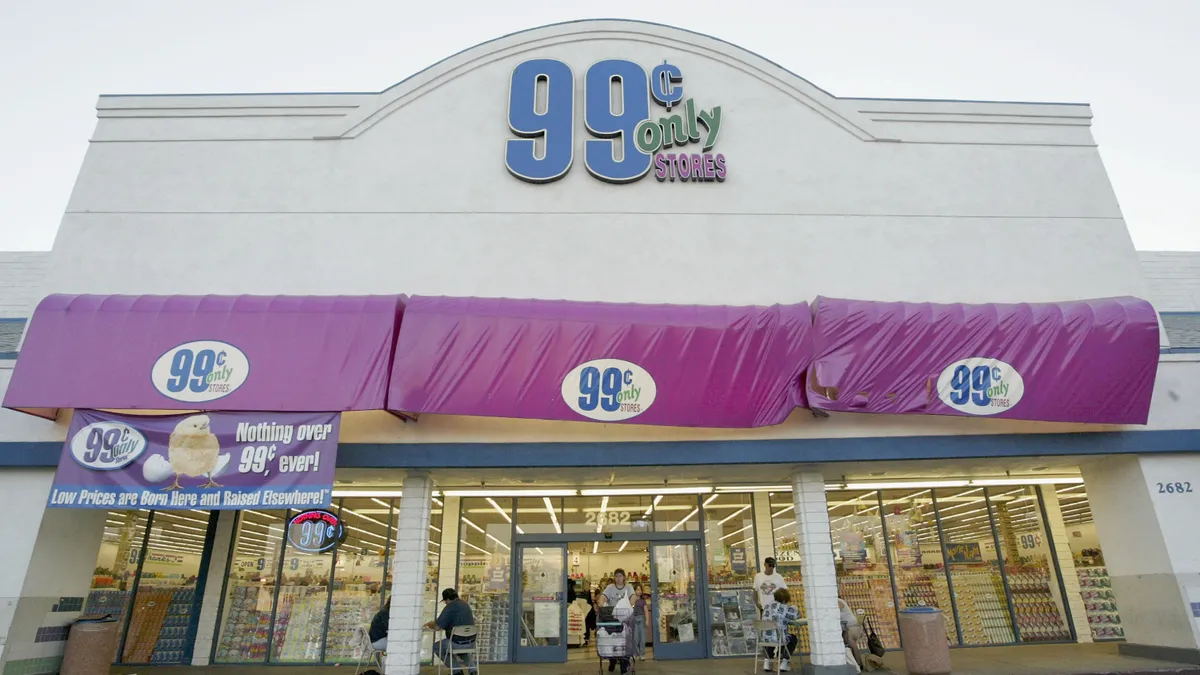Dive Brief:
- Just days after announcing it would liquidate, 99 Cents Only Stores on Sunday filed for Chapter 11 bankruptcy in Delaware. The retailer’s parent company, Number Holdings, said the bankruptcy process will enable the company to implement the wind-down of its business operations.
- The company listed assets and liabilities ranging from $1 billion to $10 billion. The company’s top 10 creditors are collectively owed just under $35 million, according to court documents.
- 99 Cents Only said it has secured $60.8 million in debtor-in-possession financing, subject to court approval, to facilitate the wind-down process. Going-out-of-business sales have begun at all 371 of the company’s stores.
Dive Insight:
California-based 99 Cents Only said Friday that after years of challenges, including the COVID-19 pandemic, inflation, rising shrink and changing consumer demand, the company was unable to identify any solutions that would enable it to stay in business.
“In light of those challenges, retailers have been forced to rethink their business operations,” Rich Traub, a corporate real estate attorney and partner at Smith, Gambrell & Russell, said in emailed comments. Traub specializes in retail-related real estate matters. “The current economic environment does not mean doom, gloom, and collapse for retailers, but demands new thinking and new approaches in order to march forward.”
As of Monday, 99 Cents Only had over 10,800 part-time and full-time employees with stores in California, Arizona, Nevada and Texas, according to court documents. The first 99 Cents Only store opened in 1982.
The company said it has filed customary motions with the court to support its operations, including payment of employees, through the wind-down process. Hilco Global is handling merchandise liquidation for 99 Cents Only. The retailer said gift cards and merchandise credits will be honored through the close of business on April 19. Fixtures, furniture and equipment are also for sale.
Hilco Real Estate is handling the sale of owned and leased real estate. The company said it has 333 leases and 44 owned properties. The owned properties include “highly desirable locations along well-known corridors” in Los Angeles, like Sunset Boulevard, Fairfax Avenue and Pico Boulevard. Other cities in which real estate assets will be offered include Houston; Phoenix; the Dallas/Fort Worth area of Texas; Sacramento, California; and San Jose, California.
“This was an extremely difficult decision and is not the outcome we expected or hoped to achieve,” interim CEO Mike Simoncic said in a statement on Friday, at the same time that the company announced he would step down. “Unfortunately, the last several years have presented significant and lasting challenges in the retail environment, including the unprecedented impact of the COVID-19 pandemic, shifting consumer demand, rising levels of shrink, persistent inflationary pressures and other macroeconomic headwinds, all of which have greatly hindered the company’s ability to operate.”















